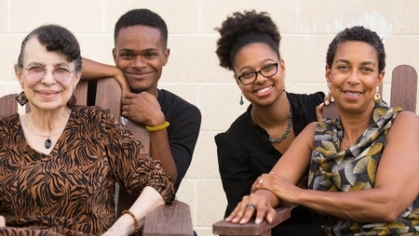Elsa Candelario, Professor of Professional Practice and Director of the Latina/o/x Initiatives for Service, Training, and Assessment (LISTA) Certificate Program, discusses Hispanic Heritage Month and its ties to the social work profession.
Hispanic Heritage Month runs from September 15 to October 15 every year and aims to recognize the rich diversity of cultures present in the United States. It is a period that celebrates the cultures and histories of Latina/o/x people. This year’s theme, “Pioneers of Change: Shaping the Future Together,” encourages us to remember the innovation and unity of Hispanic and Latina/o/x Americans.
Hispanic and Latinx communities are generous groups that have enriched our society with music, arts, literature, science, and activism. Individuals such as Celia Cruz, Gabriel García Márquez, Ellen Ochoa, Dolores Huerta, Sonia Sotomayor, and social worker Antonia Pantoja have been trailblazers and continue to shape the world today. Their achievements inspire us and future generations.
As social workers, understanding and respecting cultural backgrounds are not just important, in fact, they are ethical imperatives. The profession of social work is based on the values of respect, human dignity, and cultural competence, which means recognizing and valuing the diverse backgrounds and experiences of the individuals we serve. The Latinx community, in particular, is incredibly diverse, encompassing a wide range of national origins, languages, traditions, and experiences.
This diversity necessitates that social workers go beyond generalizations and avoid a one-size-fits-all approach to serving these communities. To provide effective and respectful interventions, we must engage in ongoing learning about the specific cultural contexts of the individuals and communities we serve. For example, it is important that social workers learn how cultural factors shape individuals' perceptions of mental health, family dynamics, and social support systems. Additionally, we cannot overlook how socioeconomic challenges and systemic barriers can hinder access to services. That is why it is essential to adapt our approaches to align with culturally specific values, employ language and communication styles that are culturally appropriate, and demonstrate sensitivity to traditional practices and beliefs.
The Latina/o/x Initiatives for Service, Training, and Assessment (LISTA) MSW Certificate Program at Rutgers School of Social Work plays a vital role in this context. LISTA addresses the critical need for social work practitioners who are trained in issues and contexts specific to Latina/o/x communities. With a mission to increase the number of culturally aware and responsive social workers, the program offers students four specialized courses, a practicum with Latinx populations, mentorship, scholarships, stipends, and peer support. This comprehensive approach promotes a sense of community among students, alleviates the financial burden of education, and enhances the quality of social work services provided to Latinx communities.
Two years ago, LISTA also launched a study abroad program to Puerto Rico with a focus on learning about the population and the impact of colonialism and natural disasters on its residents. The aim was to positively enhance the knowledge and skills of students who work with Puerto Ricans seeking social services in the mainland U.S. Such study abroad opportunities can significantly enhance students’ professional development, particularly in cultural awareness and macro concepts. These perspective-shifting experiences extend learning beyond the classroom into real-world immersion.
However, one does not need to travel far to gain similar experiences. Across the U.S., and particularly in New Jersey, many communities reflect the vibrancy of Latin American life. Our proximity to these communities offers ample opportunities for cultural exploration. There are wonderfully diverse and thriving Latinx enclaves in New Brunswick, Perth Amboy, Paterson, Elizabeth, Union City, Newark, Vineland, Camden, Bridgeton, and many others.
In celebrating Hispanic Heritage Month, I encourage you to actively engage with and learn more about the various Latinx/Hispanic cultures in New Jersey throughout the year. Participate in local events and activities that honor the people, traditions, food, music, and history of Latina/o/x Americans. Such experiential learning can be both educational and transformative.
Lastly, I invite you to discover more about programs like LISTA that are essential in advancing equity and inclusion within the social work profession and the broader community. For additional information about the LISTA Certificate Program, visit our YouTube playlist or our website.
This story was created in partnership with Rutgers School of Social Work's Inclusion, Intersectionality, Diversity, Equity, and Advancement (IIDEA) Committee.



